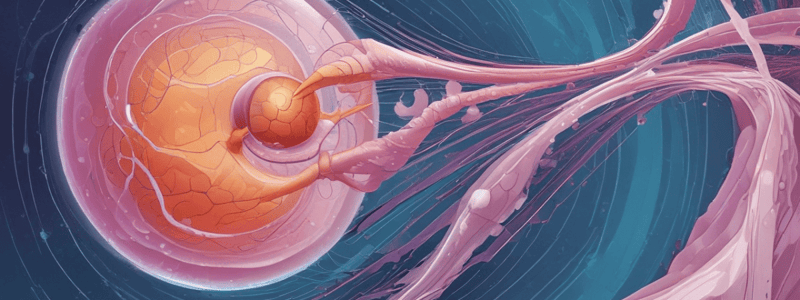Podcast
Questions and Answers
What is the approximate number of sperm cells that were competing to fuse with the egg cell?
What is the approximate number of sperm cells that were competing to fuse with the egg cell?
- 200,000 to 300,000
- 100,000 to 200,000
- 200 million to 300 million (correct)
- 1 million to 2 million
Which of the following is the correct term for the process of a sperm cell fusing with an egg cell?
Which of the following is the correct term for the process of a sperm cell fusing with an egg cell?
- Differentiation
- Gametogenesis
- Mitosis
- Fertilization (correct)
What is the term for each of the sex cells involved in the fertilization process?
What is the term for each of the sex cells involved in the fertilization process?
- Gamete (correct)
- Ovum
- Zygote
- Spermatozoa
From which parent does the ovum, or egg cell, come?
From which parent does the ovum, or egg cell, come?
What is the result of the fertilization process?
What is the result of the fertilization process?
What is the term for the cell that results from the fusion of a sperm cell and an egg cell?
What is the term for the cell that results from the fusion of a sperm cell and an egg cell?
Where does the fertilization process typically take place?
Where does the fertilization process typically take place?
What is the significance of the fertilization process?
What is the significance of the fertilization process?
What do homologous chromosomes code for?
What do homologous chromosomes code for?
How many pairs of homologous chromosomes do human beings have?
How many pairs of homologous chromosomes do human beings have?
What is the haploid number for human beings?
What is the haploid number for human beings?
What does the prefix 'hapl' in 'haploid' mean?
What does the prefix 'hapl' in 'haploid' mean?
What is the diploid number for humans?
What is the diploid number for humans?
What do biologists refer to as 'n' chromosomes?
What do biologists refer to as 'n' chromosomes?
What is the significance of the term 'zygote'?
What is the significance of the term 'zygote'?
What is the general term for the number of chromosomes in a given species?
What is the general term for the number of chromosomes in a given species?
How many chromosomes are present in a human gamete?
How many chromosomes are present in a human gamete?
What determines the sex of an offspring?
What determines the sex of an offspring?
What is the general term for either a sperm or an egg?
What is the general term for either a sperm or an egg?
How many chromosomes are present in a human zygote?
How many chromosomes are present in a human zygote?
What is the process of a zygote differentiating into an actual organism?
What is the process of a zygote differentiating into an actual organism?
What is the term for the pairs of chromosomes in a zygote?
What is the term for the pairs of chromosomes in a zygote?
What is the result of the fusion of a sperm and an egg?
What is the result of the fusion of a sperm and an egg?
What determines the number of chromosomes in a zygote?
What determines the number of chromosomes in a zygote?
What is the significance of the 23rd chromosome in a gamete?
What is the significance of the 23rd chromosome in a gamete?
What is the main difference between a gamete and a zygote?
What is the main difference between a gamete and a zygote?
Study Notes
Fertilization
- Fertilization occurs when a sperm cell fuses with an egg cell (ovum) resulting in the formation of a zygote.
- This process is the result of an epic competition where 2-3 hundred million sperm cells compete to fuse with the ovum.
Gametes
- Gametes are sex cells that have half the number of chromosomes as body cells (somatic cells).
- Sperm cells and egg cells (ova) are both gametes.
- Each gamete has half the number of chromosomes as body cells, which is 23 chromosomes in humans.
Chromosomes in Gametes
- A sperm cell has 23 chromosomes, including 22 autosomal chromosomes and 1 sex-determining chromosome (X or Y).
- An egg cell (ovum) has 23 chromosomes, including 22 autosomal chromosomes and 1 sex-determining chromosome (X).
Fertilization and Zygote Formation
- When a sperm cell fuses with an egg cell, the resulting cell is called a zygote.
- The zygote has a total of 46 chromosomes, with 23 chromosomes from each parent.
- The 46 chromosomes in the zygote are arranged in 23 pairs of homologous chromosomes.
Homologous Chromosomes
- Homologous chromosomes are pairs of chromosomes that code for the same things, but may have different variants of genes.
- Each pair of homologous chromosomes has one chromosome from each parent.
Haploid and Diploid Numbers
- Haploid number refers to the number of chromosomes in a gamete, which is 23 in humans.
- Diploid number refers to the number of chromosomes in a zygote, which is 46 in humans (2n).
- Haploid and diploid numbers vary across species.
Studying That Suits You
Use AI to generate personalized quizzes and flashcards to suit your learning preferences.
Description
Learn about the process of human reproduction, where a sperm cell fuses with an egg cell, and explore the fascinating details of this epic competition.




